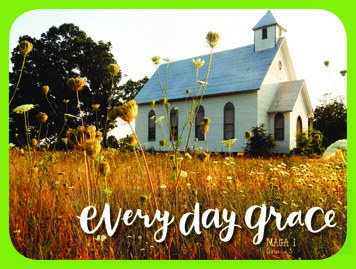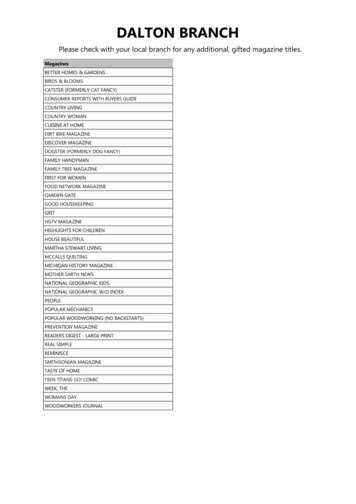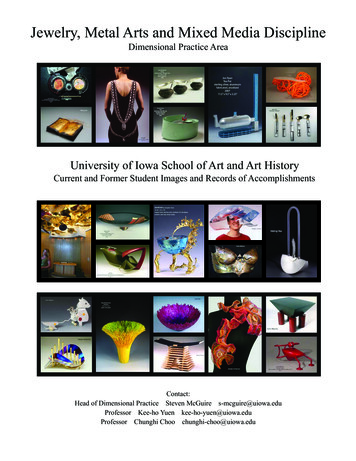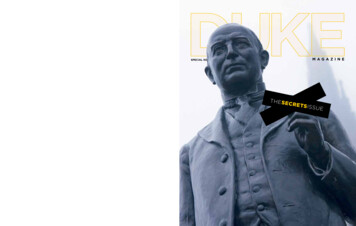
Transcription
MAGAZINEIssue No. 3
Rural2 2016 North Carolina Conference of The United Methodist ChurchFor some folks, rural is an intangible stateof mind. For others, it invokes an agriculturalimage. For demographers and the government,it is merely a geographic area with certaincharacteristics, based on population, types ofwork opportunities, or proximity to a metropolitan area.eastern North Carolina women. Hard-workingwomen. Unassuming women. Brave women.Rural women. They may not have realizedthat they even had a story until someoneasked them to put some words on paperand yet, each story is sacred. Joy. Heartache.Courage. Hope. Perseverance. Life.However you choose to define rural, the2010 US Census gives us this information:34 percent of North Carolina’s populationis considered rural. In the 56 counties withinthe North Carolina (UMC) Conference boundaries, 51 counties are classified as rural(having 250 persons or less per 1 square mile).EDG Magazine is a publication of the NorthCarolina Conference of The United MethodistChurch. We thank the gracious women whoshared their stories. Thanks to Suzanne Cobb,Jimmy Cobb, Kasey Thornton, Linda Harris,Linda Smith, and LeeAnne Thornton forcontributing to the artwork and photography.In the pages of this issue of Every Day GraceMagazine are plain but powerful, simpleyet intriguing, humble and honest stories ofMay these stories be a reflection that in everyminute of every life is a story, waiting to betold.
Telling Their StoriesCity Girl Goes Countryby Suzanne CobbPuny, Pitiful & Patheticby Anne Outland“Is That Snow?”by Esther KuhnFarm Living Is The Life For Meby Jonell LittleJust A Country Girl At Heartby Blonnie B. Johnson“Life Is Good”by Doris FlytheI Do Matterby Ellie MartinBeing A Missionary Kid To Becoming A Pastor’s Kidby Catherine Stallsmith3
City Girl Goes Countryby Suzanne CobbOn July 29, 2011 at 8:36 a.m., the phone rang at theparsonage, I could see it was someone from theMethodist Building, so I answered it.“Hey Suzanne, this is Becky Biegger in the Bishop’soffice. He would like to meet with you to discussa ministry opportunity. He will meet you tonightin the District office at 6 p.m.”It was Friday and the Bishop was going to driveto Sanford to meet with me uh oh this issomething big. I immediately called my husband,Jimmy, and said, “We are going to have to delayour trip to the mountains. The Bishop has calledand wants to meet with me tonight!!”When I arrived at the District office and he beganto talk about the people in Milwaukee, I rememberthinking, “Why is he talking about Wisconsin?” Inever knew there was a Milwaukee, North Carolina,but I soon found out it was going to be my home,and for the next four years, the people he hadbeen talking about became my family.One of my first memories was when, as I stoodin the living room of the beautiful parsonage,looking out the window at a field across the4street, I panicked. I called my friendSherri.“What have I done? I am a citygirl and I don’t know the first thingabout living in a place like this!”I heard her familiar voice on the other end ofthe phone saying, “Breathe. All you have to do islove the people and remember God is with you.”I clung to that promise, but it didn’t take long forthe “city” to come out in me.One day, I was driving down Doolittle Mill Roadand I noticed that the cotton plants had turnedbrown. Hurricane Irene had come through Milwaukee about a week before I moved there, andwhen I saw the beautiful plants were turningbrown. I called Jimmy, again in a panic.“Oh my gosh. I think the hurricane has killedthe cotton! The plants have turned brown. Thefarmers are going to be so upset!” He startedlaughing on the other end of the phone andexplained to me that was part of the process ofharvesting the cotton. The plants have to die sothey can pick it. Well, that was the first of manyexperiences of this city girl goes country!I was the first female pastor to serve the Milwaukee Charge. I remember standing in the pulpit atBethany UMC, looking out into the congregationof farmers and feeling like Belle in Beauty andthe Beast, when Lumiere and Cogsworth sawher for the first time, saying, “It’s a girl.” Then byChristmas, I felt like they were looking at me andmaybe thinking, “It’s a girl, and she can preach.”This city girl grew to love those farmers wholooked at me that way, and I have such admiration for their intelligence, perseverance andfaith in a vocation that makes such a differencein God’s Kingdom!The sweet potatoes, cabbage, and the corn thatcame out of the fields that the farmers so tenderlynurtured were the best I had ever eaten. Why?
Because they would pick them and bring themstraight to the parsonage! No preservatives, norefrigeration. They were fresh, sweet and oh, sogood. I remember one day, James Russell broughtme a head of cabbage and I ate the whole thingfor lunch and dinner by myself!This wonderful community soon learned thatthis city girl couldn’t tell the difference betweena soybean plant from a peanut plant and theyloved me anyway! They learned to calm my fearswhen I would see smoke billowing into the skyand I would think that somebody’s house wason fire, only to discover it was a “prescribedburn” where they had to occasionally burn offthe fields to improve the health of the soil. Theylaughed at me when I couldn’t figure out whatthe stench was in the whole “neighborhood.” Whoknew that chicken poop made good fertilizerand that they saved it to put on the fields?Yes, my life changed on September 1, 2011 whenI moved to Milwaukee, NC. I followed Sherri’sadvice and loved the people in that communityand they loved this city girl back. I often told themthat I felt like they live more like the Israelitesdid than any place I had ever lived. They trulylive in community with one another! I am notsaying that they all agreed, but they do love oneanother.While I served there, we honored the sages, fromthe musicians to the lifelong members. We hadthe first Confirmation class in ten years, wherewe journeyed through the scriptures, researchedwhat it meant to be a United Methodist and Ieven taught them how to put furniture polishon hardwood floors of the parsonage for animpromptu slip and slide! I baptized eleveninfants, buried their loved ones, performed several weddings and celebrated weekly worshipwith the people of the Milwaukee Charge. I lovethem, even though as a United Methodist pastor,I had to move on. The people in the MilwaukeeCharge will forever have a piece of this city girl’sheart.25She is strong and respected and notafraid of the future.26She speaks with a gentle wisdom.Proverbs 31:25-26(Good News Translation)5
Puny, Pitiful & Patheticby Anne OutlandWhat makes a school teacher so special? First,my background of becoming a teacher. I wasborn in the small community of Woodland, NCin 1934, where I had the freedom to express myself through play, exploring and family.As a child, I suffered from frequent bouts ofasthma brought on by having colds. As a result, Ihave always been protective of my health. Someof my friends say I’m too careful. As a joke, I callmyself “Puny, Pitiful and Pathetic.” My friendsenjoy teasing me about these words.I don’t have asthma anymore, but suffer fromchronic allergies which have required two noseoperations to remove nasal polyps. As I age, thiscondition seems to have abated. Praise God!I laugh when I say I’m “puny,” but in reality, I’m quiteactive and have always been – playing basketball and tennis in high school, walking dailynow for an hour or more, and doing yard work.So I guess the joke’s on me.When I was 9 years old, I expressed myself toowell. The family went to another town and becausechalkboard image: www.freeimages.co.uk6After college, I began my career of teachingsecond grade in Ahoskie, NC. I must have liked thatgrade level because I taught it for 30 years.I couldn’t be found, (probably up a tree) they leftwithout me.When they returned, I was sitting at the endof the driveway and instead of saying, “Wherehave you all been?” I said, “Where the hell haveyou been?” Daddy immediately stopped the car,causing my mother to nearly go through thewindshield. No questions were asked, and beforeGod and all the traffic on Highway 258, I got thebiggest spanking of my life.He left me there crying and later returned withthe car and said, “Get in the car, Anne.” We wentto the store and got me a bag of candy. Needless to say, I learned the meaning of that word.Because my mother and father went to college,there was never any question that my sister andI would not be going to college as well. Duringthe early 1950s, most young girls studied to bea teacher, nurse or secretary.I left home for the first time in my life to go toEast Carolina College in 1952. I had no ideawhat my major was going to be. I tell the storythat I saw a large group of students sitting inan auditorium, so I joined them. I found out thatwe were going to be teachers. Of course, I hada counselor who encouraged me to follow thatcourse of study.I realized the importance of studying to makepassing grades because my parents had two
girls in school at the same time. My sister andI roomed together for two years. We worked asdormitory hostesses. Signing date cards, approving off campus passes, and locking doors atnight was part of our job.Late one afternoon, we received a telegramtelling us that we were invited out to dinner. Wewere to meet in the parlor of our dormitory at6 p.m. Well, she and I got dressed, went to theparlor and no one called for us. We were “stoodup,” so we thought. Not until later did we findout that our classmates across the hall playedthis joke on us. We still laugh about it today.I have met so many appreciative parents in Hertford and Northampton counties, but especiallymemorable were the students from Pre-K tothird grade. Now that I’m retired, I meet many ofmy former students and expressions of love andappreciation for me has blessed me enormously.Being an “Old Maid” (and if you don’t know whatthat means, I’ve never been married), I’ve hadto learn other crafts – carpentry, working onengines, painting, etc. My friend and I look aftereach other in these matters. We call ourselves“Patch and Pray Ladies.”One time at around 11 years old, a friend calledby phone and my mother said, “She’s probablyon the roof or up a tree.” That’s just who I am.So, as you can see, God truly has blessed me, andstill does, in a mighty way.While changing classes at E.C.C., I met my favoritehistory professor, Dr. Coleman. We had a shortconversation and I told him I would be graduatingthis year (1956). He said, “Na-a-a-ah, you’ll betoo little.”According to many comments written in myannuals from classmates, I must have reallyenjoyed my four years, and I know I did, becauseit sounded like I was always “cutting up.”After college, I began my career of teachingsecond grade in Ahoskie, NC. I must have likedthat grade level because I taught it for 30 years.After retirement, I substituted for another 17 years.I taught music for a year, pushing my cart withall the equipment, laughing and saying, “I justlove my job!” The pay was terrible, but the funmade up for it.7
“Is That Snow?”by Esther KuhnSince moving to Northampton County, I havelearned a lot about country living. I was raisedin the city by a Methodist father, a Jewish motherand I married a Catholic.Before marriage, I attended the Methodist Church;after marriage, we went to the Episcopal Churchand when my husband died, I returned to theMethodist Church. Who says you can’t mixdenominations? It only takes love and consideration for one another. In my family, we have Baptist,Catholic, Methodist and non-denominational,and we all love each other.My mother said very little about her Jewish religion.In those days, they were not well thought ofand it was difficult for Jewish people. When mygrandfather and grandmother came to this countryfrom Russia and Romania, they changed theirname from Silverman to Taylor. My grandfatherwas a tailor, so he settled for the name Taylor.My mom and dad got married young. My dad wasstill in college, my mom had moved to Virginiafrom Connecticut. Their marriage ended hiscollege days, and his new life as a married man8began with a little Jewish woman. Dad was anonly child, so it was back home to his parentswith his bride.My mother was so kind and patient; she livedwith my grandmother for 43 years. They neverhad a cross word, but they gave the chair a fit.Mama would turn a chair one way, Grandmawould go by the chair, notice it had been turnedand she would turn it back. That was the extentof their disagreement. My mom was so good tomy grandmother. When my grandma was takento the hospital, where she later died, she lookedat my Mom and said “Jennie.” My mom said, “I’mcoming,” and she stayed with her until she died.Sunday afternoon always was a quiet day – noskates, bikes or being loud; no movies or shopping;certainly no grass cutting or washing clothes. No,Grandma wouldn’t have that and to this day, Inever wash clothes or cut grass on Sundays.This was one of Grandma’s rules.I had five sisters and one brother who was killedin an auto accident at 23 years old. It took a tollon my parents – the only son and only brother.
After Grandma died, my sisters, except for thebaby sister and me, were married and in theirown homes. My dad bought a home in VirginiaBeach. So Daddy, Mama, Baby Sister and I movedto Virginia Beach.I worked in Virginia Beach until I moved upnorth to be with my oldest sister. After ten years,I came back to Virginia Beach and married myhusband. We moved to Southside, VA. After retirement, we wanted to be closer to family, butdidn’t want the hustle and bustle of the beach.We decided to look in North Carolina close tothe Virginia line.We rode down to Northampton County to seewhat it was like and on our way down, I saw littlepieces of white along the side of the road. I saidto my Yankee husband, “Is that snow?” He lookedat me, shook his head and said “No, that’s cotton.”That was my first encounter with cotton.We moved to Northampton County. I didn’t realizeat the time I would be surrounded by Duke, NCState and Tar Heel fans – me a University ofVirginia Cavaliers fan. I was the only Virginia fanin the county.A few years later, the Baptist church got a newpreacher. Yea! He not only was from Virginia; hewas a Cavalier fan. I was so glad to see him, Iwanted to hug him but I didn’t. That made two ofus Virginia fans in Northampton County.“Who says you can’t mix denominations? Itonly takes love and consideration for one another.”While living up north for ten years, I met somevery nice people. Yankees indeed! However,even though they were friendly and willing tohelp you, if you needed help, they were verycautious not to interfere. That was the impressionI got from being around them.After we had been in Carolina for a little while, Iwas outside as two young boys around 12 yearsof age came down the street. One was riding hisbike, the other was pushing his. It had a flat tire.When they saw me, they asked if I had an airpump. I told them I did and got it. After pumping9
the tire, they thanked me and went on their waythose two little boys of color.As I was walking toward the door to go in, thelady next door drove up in her driveway. I reallydidn’t know her as she hadn’t been living therelong. She said to me, “Those boys are bad, I justwant you to know that.”I looked at her and said, “They just needed air inthe tire.”Her next statement was, “Well, they are bad, Iknow because I teach them.”I looked at her and said,“They just wanted airin the tire.” And with that we parted. As I waswalking toward the door, I thought perhaps theyneeded a little more TLC.I love Carolina sayings and humor. I rememberafter being here a while, I met one of the ladiesand asked how she was. She said, “The ox is inthe ditch.”“Oh,” I said, “I didn’t know you had an ox.” Shelaughed and later I found out it means she hada problem. So much for this City Gal! And listento this 90-year-old: when you see those whitepieces on the side of the road, it’s not snow.it’s cotton!10“My mother was so kind and patient; shelived with my grandmother for 43 years. They neverhad a cross word, but they gave the chair a fit.”
Farm Living Is The Life For Meby Jonell LittleI am fortunate enough to live in what I think isthe prettiest place on earth. It is in a big, oldtwo-story farmhouse with a bright red roof,sitting back off the road, surrounded by pastures, a pond, and farm land. We have cows andcalves grazing in the pastures, eagles, geese,and ducks flying around the pond, with deerand turkeys out in the fields. The sunrises andsunsets are spectacular and not so easily seenor enjoyed if you lived in the city. Rural/countrylife allows us to commune with nature and thisbeautiful world that God has created. With nocity lights around, we can see the stars and theheavens at night. How lovely the sky is with thesparkle of the diamond-like stars.I think that those of us who are blessed to livein the country can feel closer to God becausethe quiet and peacefulness of the rural setting.It allows us to see God’s Majesty, and all thewondrous nature he has given us. How can wedoubt God’s power and grace?My home is on a farm in rural northeasternNorthampton County, North Carolina, wherefarms and agriculture are, and always havebeen, the main business. The house was built inthe late 1700s and owned for three generations by the Rogers Family. My father came tothe farm around the age of 10, was raised bythe Rogers family and lived here the rest of hislife. He farmed with them and loved the life ofa farmer. He married my mother and broughther home to the farm. They lived here with theRogers brothers and when the brothers died,they inherited the farm. I am an only child and Iwas born, raised, and have lived here my wholelife, except for college years. It is the only placeI have ever wanted to live.11
As the old song on the Green Acres TV show said“Green acres is the place for me, farm living is thelife for me.” That says just how I feel. Countryliving is just right for me. I was born in the 50sand enjoyed growing up on the farm. We werefree to play outside all day and roam the woodswithout worrying about any danger. Our farmraised peanuts (my favorite crop), corn, cotton,wheat, and soybeans. I loved the smell of thedirt as it was tilled and planted, then the distinctsmell when the peanuts were “dug” from theground and harvested.I learned to drive the tractors and trucks onthe farm. If I had been born a few years later, Imight have become ‘the farmer,” but back then,women were not encouraged to farm on theirown. It is still mainly a man’s profession, butwomen do farm alone now.Be patient, then, my friends, until the Lordcomes. See how patient farmers are as they waitfor their land to produce precious crops. Theywait patiently for the autumn and spring rains.7James 5:7(Good News Translation)12Farm wives have always helped their husbandsand worked with them on the farm, but rarelydid they farm it on their own. Prior to the 1970s,it wasn’t considered ladylike for women to run/work the farm. Things have changed and womendo farm and have many occupations that wereonce considered things they could not or shouldnot do.When my husband, David, and I married fortyyears ago, we moved across the driveway frommy parents’ home on the farm, and we havelived here all of our married life. We have onedaughter, Beth, who is married and lives about
40 miles away. My husband and I farmed for awhile, but his true passion is as a mechanic. Heopened a small engine repair shop in a nearbytown. We worked together in that business for27 years. God blessed us with a good business.We had wonderful customers and friends whosupported our business all those years.My husband has had many hobbies over theyears – flying, hunting, go-kart racing, which wedid as a family, and then there is building his ownflying machines! Being a mechanic, he knows howto fix things and put them together. This led to adesire to buy a kit and build a gyrocopter. This is across between a small helicopter and an ultralight plane. He has built two of them. Needlessto say, we are the only folks with one in our areaand in the eastern part of the state, too!retired and are enjoying this phase of our lives now.I am thankful for my Christian upbringing andall the blessings God has given me in my life.I belong to a lovely country Methodist Churchjust three miles down the road from my home.I have attended this church all my life. It wasstarted as a bush arbor in the early 1830s. Achurch was constructed in 1839; later a newbrick building was constructed, and remainsthere today. My mother’s family were some of thefounding members of that church. This church,as well as my parents, gave me a sure foundation of faith in God and the love of Jesus Christ. Ihave had ups and downs like everyone, but Godhas been and is always present.As I have grown, my faith has grown, too. We areso blessed to live in a country where we are freeto worship without fear of persecution. What ablessing that is too. God is so good to us, lovingus always, even when we stray. How wonderful itis to know that God is always there, in the goodtimes as well as the bad times.One of my favorite hymns is “In the Garden” andit reminds me of the joys of the quiet peacefulcountry life where we can walk and talk withGod and see the wonders of his handiwork ineverything around us. Thanks be to God!It is a curious sight to see him flying around onhis gyro. Everyone knows it’s him. It flies lowenough and slow enough, that you can see himand he us. Kids as well as the grown-ups enjoyseeing him fly over and waving. We have traveledto lots of states for “fly-ins,” gatherings of othergyro pilots. He has used the gyro to help lookfor missing persons, lost cattle, dogs, and evenonce helped the Sheriff’s Department look forthe car of a murder suspect.When my parents died, we moved into the “BigHouse,” as we call the farm house. We want tocontinue to care-take this home that God hasallowed to stand for all these years. We have13
Just A Country Girl At Heartby Blonnie B. JohnsonI am an 81-year-old woman who is just a countrygirl at heart. I was born December 1933, duringthe Great Depression. My early childhood was in athree-room tenant house on my Grandfather’sfarm. My father was a farmer by trade andheart. My mom grew up on a farm. My parentsstarted their married life with 150, borrowedfrom an uncle to furnish their three rooms. Myfather sold peanuts that first year for .90 per100-pound bag. They loved the land, were hardworkers and always provided for our family. Mybrother, four years my junior, and I had a wonderful childhood on the farm.Starting out in those depression years musthave been extremely hard for my parents, butI never felt the lack of anything I needed. I hadloving parents, clothes on my back, food on thetable and warmth in the cold winters. I rememberstudying by an Aladdin lamp, food cooked ona wood cook stove, outdoor toilet and warmthprovided by a fireplace.Roanoke Electric Cooperative was founded in 1939to provide electricity for rural areas. Before wewere fortunate enough to get electricity, my father14built a windmill and had power to run a radioand one or two light bulbs. I can remember theday when we received electricity but cannot remember the year. Over time, we got an electriccook stove and later a refrigerator and a deepfreeze. My father added a room and we had ourfirst indoor bathroom – what a luxury!My father used his carpentry skills to add roomsto those three rooms and my brother and I hadour own bedrooms. He continued to add roomsover the years until we had nine rooms. I amproud to say that to this day, I live in the homewhere I was born and grew up because I am justa country girl at heart.Through the years, my father raised cotton, peanuts,corn, grain sorghum, soybeans and wheat. Heraised hogs that provided us with meat and wehad a cow that provided us with milk. We alwayshad a big vegetable garden. He was also remembered for the good sweet potatoes he raised. Myfather raised laying hens and provided eggs for ahatchery.
I grew up helping on the farm, chopping, pickingcotton, stacking peanuts, turning potato vinesand all the many jobs on the farm. To this day,I still mow my lawn and areas surrounding thefarm buildings.I knew, and still know, the hardships of farming,though it has changed greatly since my early years,when farming was done with mules, to this day offarming with high-dollar tractors and completemechanization. It is still a profession with muchstress and is such a big gamble. As Will Rogerssaid, “The farmer has to be an optimist or hewouldn’t still be a farmer.” Farmers can do everything just right but can be devastated by drought,too much rain, occasionally a hurricane, insectsand an early frost or freeze. Farmers have tolove the land and what they do to be happy andsuccessful in the farming profession.keep its school. It was finally determined that wewould be combined with the school in Conway.Thus I started riding the big school bus to Conway.Each morning, as I left home, my little brotherwould stand on the porch and say, “Bye Thusta”(sister). Every afternoon, as I exited the bus atmy home, all the kids on the bus would chimeout, “Bye Thusta.” Thus began my twelve yearsof school at Conway, where I received my highschool diploma in 1952. My class met this yearfor our 63rd reunion. I am one of the few in myclass who never left Northampton County.I was a single Mom. My mother and father helpedme raise my daughter on our family farm andkept her while I worked. She got to do countrythings - play outside, go fishing with her grandfather, play with her cat and enjoy nature. Ifeel she had a wonderful childhood filled withlove and caring. She gave me my only preciousgranddaughter. That granddaughter has given methree wonderful and loving great granddaughters.How blessed this country girl has been!ln my early years, church, school and familywere important aspects of growing up. My familyattended church every Sunday. I often think ofthose Sunday school teachers who taught ofJesus and his love for us. My school teacherswere respected and loved and my family lifewas the best.My first year of school started in a school buildingthat still stands as a Civic Center in our little villageof Milwaukee, NC. After a week or so of school inMilwaukee, the school bus would come to takeus to the big school in Conway, but our teacherwould send them back as Milwaukee wanted to15
“Do not stop thinking of life as anadventure. You have no security unless youcan live bravely, excitingly, imaginatively.”Eleanor RooseveltBethany United Methodist Church has played animportant part in my life. My dad always played animportant part in our church, either as an officeror teacher. He attended Bethany UMC until hewas physically unable in his late 80s.My church family has meant much to me throughall these 81 years. I have tried to play a role inmy church life as a teacher, working with theyouth and as a member of the choir. My passionfor others has been a driving force in my beingable to help others when a need exists. At 81, Iam able to deliver Meals on Wheels to membersof the community who have this need and helpdeliver weekend backpack meals for underprivileged children to a local elementary school.16Bethany United Methodist Church is one of thefour churches on the Milwaukee Charge. Severn,Woodland and Zion complete the charge. Ourchurches work together, worship together andpray together. In 1960, I was asked to be ChargeTreasurer. I served in this capacity through 2012and continue to serve as Assistant Treasurer. Iappreciate the confidence these churches haveplaced in me over these many years.In 1959, I started my work career with the Agricultural Stabilization Conservation Office, now theFarm Service Agency, in Northampton County.During the Great Depression, farming remaineda common way of life for millions of Americans.The United States Department of Agriculture isthe federal executive department responsiblefor developing and executing federal govern-ment policy on farming, agriculture, forestry andfood. It aims to meet the needs of farmers, promote agricultural trade and production, work toassure food safety, protect natural resources,foster rural communities and end hunger in theUnited States and the world. We granted loansto farmers; administered land allotment andmarketing quota programs; shared the cost ofresource conservation and environment protection measures with farmers.My passion was to work with, and for, the farmersof my county. I continued my work with farmersand the Agency until I retired in November1996. I continue my involvement with farming asbookkeeper for my brother and cousin in theirfarming operation. I still have my passion andlove for farmers who feed our nation and produceproducts that we Americans use every day ofour lives.I am blessed to live in the country, where I canlook out from my home and see the sun risein the morning, sun set in the evening, see themoon and stars, and crops growing around mein the beautiful world God created for us. Whata blessed life I have had and continue to have asjust a country girl at heart!
“Life Is Good”by Doris FlytheI was not born a Methodist. I gained that status bymarrying a Methodist, Leon Flythe, and attendingworship in his church. My church was not anoption as it was more than two and a half hoursaway. I had been born Doris Dawson, into aChristian family, in Sampson County (Spivey’sCorner), the youngest of seven living siblings.Religious practices had long been establishedunless you were sick, you went to church on Sunday.My mother was teaching the adult women. Shebegan teaching at the age of 15 in the children’sdepartment and progressed upward. She retiredat the age of 75 from a class that bore her name:T
Magazine are plain but powerful, simple yet intriguing, humble and honest stories of 2016 North Carolina Conference of The United Methodist Church eastern North Carolina women. Hard-working women. Unassuming women. Brave women. Rural women. They may not have realized that they even had a story until someone asked them to put some words on paper








![Tamil Computer Magazine Free [WORK] Pdf](/img/63/tamil-computer-magazine-free-download-pdf.jpg)

